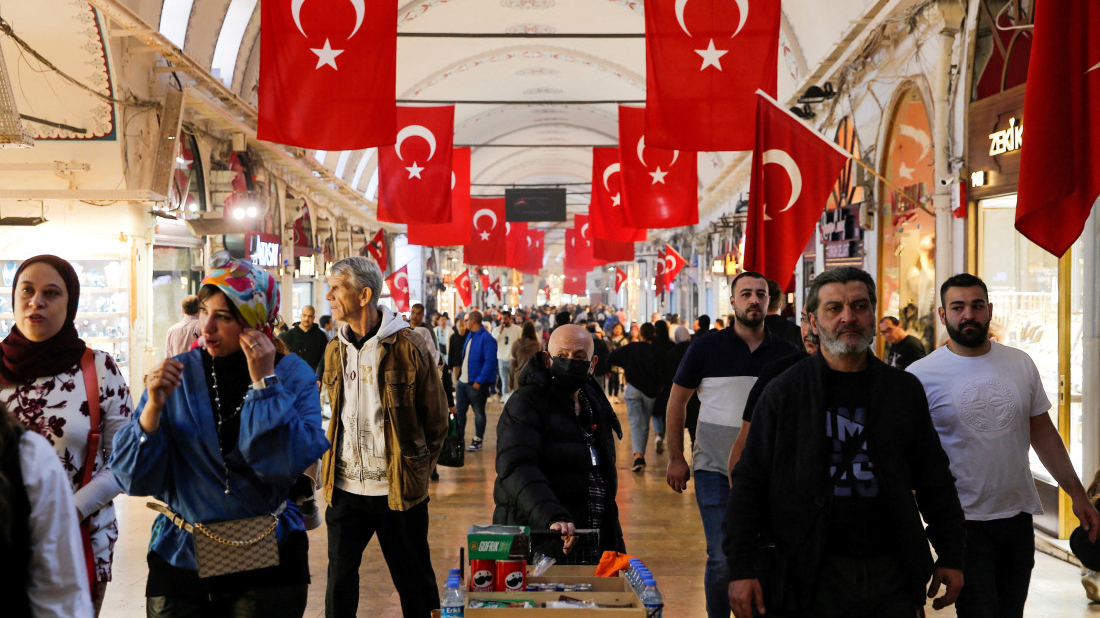Google AI boss calls for more study of potential AI threats
The chief executive of Google DeepMind, Demis Hassabis, has called for more urgent research into the potential dangers posed by artificial intelligenc...

Turkish annual inflation dropped to 49.38% in September, but a higher-than-expected monthly rate of nearly 3% raised caution from the central bank. With the policy rate now above annual CPI, analysts predict interest rate cuts may not begin until next year despite earlier expectations.
Turkish annual inflation eased to 49.38% in September, while the monthly rate surged higher than expected to nearly 3%, prompting caution from the central bank and delaying anticipated interest rate cuts.
The central bank's policy rate, now at 50%, has surpassed the annual consumer price index (CPI) for the first time since 2021, marking a key point in the aggressive monetary tightening aimed at curbing inflation after years of easy money and rising prices.
However, Central Bank Governor Fatih Karahan warned that more progress is needed before reaching the bank’s inflation goals. He outlined two critical conditions: a significant and sustained decrease in the monthly inflation trend, and the alignment of expectations with the bank’s own forecast range. Last month’s inflation spike was partially driven by education-related costs.
Following the release of the inflation data, the lira strengthened slightly, trading at 34.18 against the dollar. Analysts have revised their expectations for interest rate cuts, with some now predicting no easing before next year. JPMorgan, which had initially forecast a cut in November, now expects easing to start in January. Capital Economics also sees a rate cut this year as "very unlikely."
Month-on-month inflation was 2.97%, above the 2.2% predicted by a Reuters poll. The annual CPI also exceeded the forecast of 48.3%. In August, inflation was 2.47% month-on-month, with an annual rate of 51.97%.
Although the central bank is closely monitoring the monthly inflation rate for signs of when to begin easing, it has only fallen below 2% once this year, in June. Analysts like Haluk Burumcekci suggest that even if October inflation aligns with central bank guidance, it may not be enough to trigger a November rate cut, with most analysts now expecting easing by 2025.
TIGHT POLICY
Turkish domestic producer price index rose 1.37% month-on-month in September, with an annual increase of 33.09%. Inflation was driven by sharp rises in housing (97.9%) and education costs (93.59%), while food prices increased 43.72%.
The central bank held rates at 50% for a sixth month, signaling potential easing but maintaining a tight stance until price stability is achieved. Households expect 12-month inflation at 71.6%, much higher than market forecasts of 27.5%. The bank predicts inflation will fall to 38% by year-end, while the government expects 41.5%.
Quentin Griffiths, co-founder of online fashion retailer ASOS, has died in Pattaya, Thailand, after falling from the 17th floor of a condominium on 9 February, Thai police confirmed.
Cubans are increasingly turning to solar power to keep businesses operating and basic household appliances running during prolonged electricity cuts, as fuel shortages make diesel generators and other temporary solutions more difficult and costly to maintain.
Ukraine’s National Paralympic Committee has announced it will boycott the opening ceremony of the Milano Cortina 2026 Paralympics in Verona on 6 March, citing the International Paralympic Committee’s decision to allow some Russian and Belarusian athletes to compete under their national flags.
Eric Dane, the actor best known for his roles in 'Grey’s Anatomy' and 'Euphoria', died on Thursday, at the age of 53 after a battle with amyotrophic lateral sclerosis (ALS). His family confirmed his death after what they described as a “courageous battle” with ALS.
An Austrian climber has been convicted of gross negligent manslaughter after his girlfriend died from hypothermia while climbing Austria’s highest peak, the Grossglockner, in January 2025.
Millions of Colombian roses have arrived in the United States just in time for Valentine’s Day, keeping the country on track as the world’s second-largest flower exporter. Between 15 January and 9 February, Colombia shipped roughly 65,000 tons of fresh-cut blooms.
Russia’s car market is continuing to receive tens of thousands of foreign-brand vehicles via China despite sanctions imposed after Moscow’s full-scale invasion of Ukraine in 2022, a journalistic investigation has found.
Türkiye’s national energy company, TPAO, has struck a new cooperation deal with U.S. energy giant Chevron, signing a memorandum of understanding to explore joint oil and gas exploration and production opportunities, the Turkish Energy and Natural Resources Ministry announced on Thursday.
Wall Street ended sharply lower on Tuesday as investors worried about artificial intelligence (AI) creating more competition for software makers, keeping them on edge ahead of quarterly reports from Alphabet and Amazon later this week.
U.S. stock markets finished mixed on Wednesday (28 January) as investors reacted calmly after the Federal Reserve left interest rates unchanged, a decision that had been widely expected and largely priced in.
You can download the AnewZ application from Play Store and the App Store.

What is your opinion on this topic?
Leave the first comment